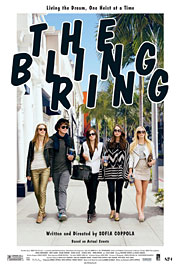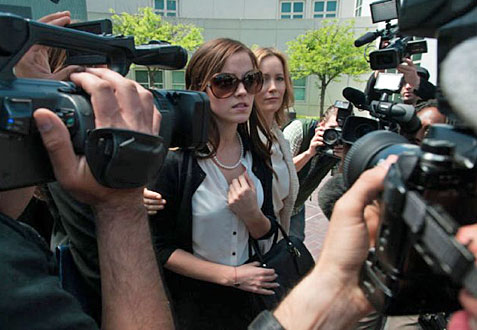Movie Review: “The Bling Ring”

Sofia Coppola was once heralded as one of Hollywood’s most promising young directors, but over the years, she’s looked more likely to follow in the footsteps of her famous father’s recent work than his celebrated early films. After duds like “Marie Antoinette” and “Somewhere,” Coppola needed to deliver something great to get her career back on track, but while “The Bling Ring” offers an interesting commentary on America’s fame-obsessed youth culture, it’s an incredibly shallow exposé that barely skims the surface of what could have been a fascinating drama. Based on Nancy Jo Sales’ Vanity Fair article “The Suspect Wore Louboutins,” there’s no real point to the movie, unless it’s to say that stealing from B-list celebrities will make you equally as famous, in which case, isn’t it just contributing to the problem?
Though all of the names have been changed, Coppola doesn’t shy away from the fact that it’s based on a true story. If only the studio was as upfront about Emma Watson’s involvement, because despite being marketed as the star of the film, the actress plays a surprisingly small role. Instead, the story is centered on a gay outcast named Marc (Israel Broussard), who meets type-A bad girl Rebecca (Katie Chang) during his first day at a new school and is promptly taken under her wing. After wetting their feet with some petty thefts, Rebecca convinces Marc to break into Paris Hilton’s house when they read on a gossip website that she’s out of town for the night, leaving the pair free to go on a mini shopping spree of the hotel heiress’ massive wardrobe.
When they boast about how easy their conquest was to friends Nicki (Watson), Sam (Taissa Farmiga) and Chloe (Claire Julien), the group of teenage kleptomaniacs returns to Hilton’s house to indulge in their celebrity fantasies, leading to a series of burglaries in the homes of other Hollywood Hills residents like Lindsay Lohan, Megan Fox, Miranda Kerr and Rachel Bilson. (In every instance, one of the doors was either unlocked, or in the case of Hilton, a key was left under the doormat.) And since Coppola intercuts the main narrative with scenes of the rich kids preparing for their big day in court, it’s not a spoiler to reveal that they were eventually caught.
The problem with “The Bling Ring” is that it doesn’t really cover any new ground, and as a result, the movie comes off looking even more superficial than its subjects. Coppola doesn’t attempt to dig very deep into the lives of her characters, and she doesn’t seem to care either, instead laser-focused on making everything look glamorous, from the robberies themselves to the late night partying that follows. It’s hard to blame the actors for this lack of character depth, and newcomers Broussard and Chang actually do a fairly good job of carrying the film in spite of Coppola’s thin script. However, Watson is the only truly captivating member of the so-called Bling Ring (whose inspiration, Alexis Neiers, even had her own MTV reality series), and her spot-on performance provides many of the movie’s darkly comical moments. Leslie Mann also earns some laughs as Watson’s oblivious mother, a walking PSA for bad parenting who homeschools her daughters using lessons from “The Secret,” and it’s a shame that their relationship doesn’t get more screen time.
More than anything else, though, the film is incredibly repetitive. It’s barely 90 minutes long, and a shockingly large portion of that is dedicated to the same formula: Google celebrity’s address, steal expensive shit, party like a rock star, rinse and repeat. Though Coppola raises some interesting questions about fame and privacy, she never tries to answer them, and it gets to the point where it begins to feel like she’s celebrating their crimes instead of vilifying them. For a movie draped in materialism and excess, “The Bling Ring” is pretty unsatisfying, and although some might argue that that’s the whole point, it’s one hell of a gamble on Coppola’s part just to make an artistic statement, especially one that doesn’t work very well.
Related Posts
Posted in: Entertainment, Movie Reviews, Movies
Tags: Emma Watson, Sofia Coppola, The Bling Ring, The Bling Ring review
















